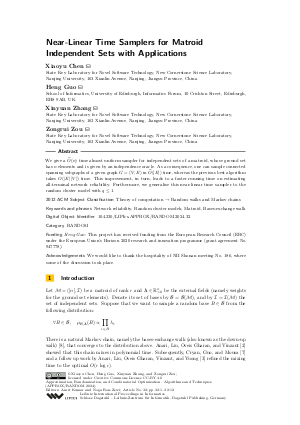Near-Linear Time Samplers for Matroid Independent Sets with Applications
Authors Xiaoyu Chen, Heng Guo, Xinyuan Zhang, Zongrui Zou
-
Part of:
Volume:
Approximation, Randomization, and Combinatorial Optimization. Algorithms and Techniques (APPROX/RANDOM 2024)
Part of: Series: Leibniz International Proceedings in Informatics (LIPIcs)
Part of: Conference: International Conference on Approximation Algorithms for Combinatorial Optimization Problems (APPROX)
Part of: Conference: International Conference on Randomization and Computation (RANDOM) - License:
 Creative Commons Attribution 4.0 International license
Creative Commons Attribution 4.0 International license
- Publication Date: 2024-09-16
File

PDF
LIPIcs.APPROX-RANDOM.2024.32.pdf
- Filesize: 0.64 MB
- 12 pages
Document Identifiers
Subject Classification
ACM Subject Classification
- Theory of computation → Random walks and Markov chains
Keywords
- Network reliability
- Random cluster modek
- Matroid
- Bases-exchange walk
Metrics
- Access Statistics
-
Total Accesses (updated on a weekly basis)
0PDF Downloads0Metadata Views
Abstract
We give a Õ(n) time almost uniform sampler for independent sets of a matroid, whose ground set has n elements and is given by an independence oracle. As a consequence, one can sample connected spanning subgraphs of a given graph G = (V,E) in Õ(|E|) time, whereas the previous best algorithm takes O(|E||V|) time. This improvement, in turn, leads to a faster running time on estimating all-terminal network reliability. Furthermore, we generalise this near-linear time sampler to the random cluster model with q ≤ 1.
Cite As Get BibTex
Xiaoyu Chen, Heng Guo, Xinyuan Zhang, and Zongrui Zou. Near-Linear Time Samplers for Matroid Independent Sets with Applications. In Approximation, Randomization, and Combinatorial Optimization. Algorithms and Techniques (APPROX/RANDOM 2024). Leibniz International Proceedings in Informatics (LIPIcs), Volume 317, pp. 32:1-32:12, Schloss Dagstuhl – Leibniz-Zentrum für Informatik (2024)
https://doi.org/10.4230/LIPIcs.APPROX/RANDOM.2024.32
BibTex
@InProceedings{chen_et_al:LIPIcs.APPROX/RANDOM.2024.32,
author = {Chen, Xiaoyu and Guo, Heng and Zhang, Xinyuan and Zou, Zongrui},
title = {{Near-Linear Time Samplers for Matroid Independent Sets with Applications}},
booktitle = {Approximation, Randomization, and Combinatorial Optimization. Algorithms and Techniques (APPROX/RANDOM 2024)},
pages = {32:1--32:12},
series = {Leibniz International Proceedings in Informatics (LIPIcs)},
ISBN = {978-3-95977-348-5},
ISSN = {1868-8969},
year = {2024},
volume = {317},
editor = {Kumar, Amit and Ron-Zewi, Noga},
publisher = {Schloss Dagstuhl -- Leibniz-Zentrum f{\"u}r Informatik},
address = {Dagstuhl, Germany},
URL = {https://drops.dagstuhl.de/entities/document/10.4230/LIPIcs.APPROX/RANDOM.2024.32},
URN = {urn:nbn:de:0030-drops-210254},
doi = {10.4230/LIPIcs.APPROX/RANDOM.2024.32},
annote = {Keywords: Network reliability, Random cluster modek, Matroid, Bases-exchange walk}
}
Author Details
- State Key Laboratory for Novel Software Technology, New Cornerstone Science Laboratory, Nanjing University, 163 Xianlin Avenue, Nanjing, Jiangsu Province, China
- School of Informatics, University of Edinburgh, Informatics Forum, 10 Crichton Street, Edinburgh, EH8 9AB, UK
- State Key Laboratory for Novel Software Technology, New Cornerstone Science Laboratory, Nanjing University, 163 Xianlin Avenue, Nanjing, Jiangsu Province, China
Funding
- Guo, Heng: This project has received funding from the European Research Council (ERC) under the European Union’s Horizon 2020 research and innovation programme (grant agreement No. 947778).
Acknowledgements
We would like to thank the hospitality of NII Shonan meeting No. 186, where some of the discussion took place.
References
- Nima Anari, Kuikui Liu, Shayan Oveis Gharan, and Cynthia Vinzant. Log-concave polynomials III: Mason’s ultra-log-concavity conjecture for independent sets of matroids. arXiv, abs/1811.01600, 2018. URL: https://arxiv.org/abs/1811.01600.
-
Nima Anari, Kuikui Liu, Shayan Oveis Gharan, and Cynthia Vinzant. Log-concave polynomials II: high-dimensional walks and an FPRAS for counting bases of a matroid. In STOC, pages 1-12. ACM, 2019.

- Nima Anari, Kuikui Liu, Shayan Oveis Gharan, Cynthia Vinzant, and Thuy-Duong Vuong. Log-concave polynomials IV: approximate exchange, tight mixing times, and near-optimal sampling of forests. In STOC, pages 408-420. ACM, 2021. URL: https://arxiv.org/abs/2004.07220v2.
- Nima Anari, Shayan Oveis Gharan, and Cynthia Vinzant. Log-concave polynomials, entropy, and a deterministic approximation algorithm for counting bases of matroids. In FOCS, pages 35-46. IEEE, 2018. URL: https://arxiv.org/abs/1807.00929v2.
- Petter Brändén and June Huh. Hodge-Riemann relations for Potts model partition functions. arXiv, abs/1811.01696, 2018. URL: https://arxiv.org/abs/1811.01696.
- Petter Brändén and June Huh. Lorentzian polynomials. Ann. of Math. (2), 192(3):821-891, 2020. URL: https://arxiv.org/abs/1902.03719v6.
-
Mary Cryan, Heng Guo, and Giorgos Mousa. Modified log-Sobolev inequalities for strongly log-concave distributions. Ann. Probab., 49(1):506-525, 2021.

-
Tomás Feder and Milena Mihail. Balanced matroids. In STOC, pages 26-38. ACM, 1992.

-
Cornelius M. Fortuin and Pieter W. Kasteleyn. On the random-cluster model. I. Introduction and relation to other models. Physica, 57:536-564, 1972.

-
Heng Guo and Kun He. Tight bounds for popping algorithms. Random Structures Algorithms, 57(2):371-392, 2020.

-
Heng Guo and Mark Jerrum. A polynomial-time approximation algorithm for all-terminal network reliability. SIAM J. Comput., 48(3):964-978, 2019.

-
Heng Guo, Mark Jerrum, and Jingcheng Liu. Uniform sampling through the Lovász local lemma. J. ACM, 66(3):18:1-18:31, 2019.

-
Leonid Gurvits. On multivariate Newton-like inequalities. In Advances in combinatorial mathematics, pages 61-78. Springer, Berlin, 2009.

-
Leonid Gurvits. A polynomial-time algorithm to approximate the mixed volume within a simply exponential factor. Discrete Comput. Geom., 41(4):533-555, 2009.

-
Mark Jerrum. On the complexity of evaluating multivariate polynomials. PhD thesis, The University of Edinburgh, 1981.

-
Mark R. Jerrum, Leslie G. Valiant, and Vijay V. Vazirani. Random generation of combinatorial structures from a uniform distribution. Theoret. Comput. Sci., 43(2-3):169-188, 1986.

-
Vladimir Kolmogorov. A faster approximation algorithm for the gibbs partition function. In COLT, volume 75, pages 228-249. PMLR, 2018.

-
Giorgos Mousa. Local-to-Global Functional Inequalities in Simplicial Complexes. PhD thesis, The University of Edinburgh, 2022.

-
J. Scott Provan and Michael O. Ball. The complexity of counting cuts and of computing the probability that a graph is connected. SIAM J. Comput., 12(4):777-788, 1983.

-
Daniel Štefankovič, Santosh Vempala, and Eric Vigoda. Adaptive simulated annealing: a near-optimal connection between sampling and counting. J. ACM, 56(3):Art. 18, 36, 2009.

-
Leslie G. Valiant. The complexity of enumeration and reliability problems. SIAM J. Comput., 8(3):410-421, 1979.

-
Christian Wulff-Nilsen. Faster deterministic fully-dynamic graph connectivity. In SODA, pages 1757-1769. SIAM, 2013.

